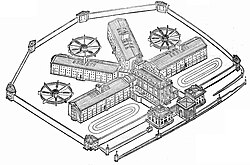
Back Markedsmanipulation Danish Marktmanipulation German Manipulasyonê finansi DIQ Manipulación del mercado Spanish Merkatuaren manipulazio Basque دستکاری بازار Persian Manipulation boursière French הרצת מניות HE Շուկայի մանիպուլյացիա Armenian Manipulasi pasar ID
| Criminology and penology |
|---|
 |
In economics and finance, market manipulation occurs when someone intentionally alters the supply or demand of a security to influence its price. This can involve spreading misleading information, executing misleading trades, or manipulating quotes and prices.[1][2][3]
Market manipulation is prohibited in most countries, in particular, it is prohibited in the United States under Section 9(a)(2)[4] of the Securities Exchange Act of 1934, in the European Union under Article 12 of the Market Abuse Regulation,[5] in Australia under Section 1041A of the Corporations Act 2001, and in Israel under Section 54(a) of the securities act of 1968. In the US, market manipulation is also prohibited for wholesale electricity markets under Section 222 of the Federal Power Act[6] and wholesale natural gas markets under Section 4A of the Natural Gas Act.[7]
- ^ "Market Manipulation | Investor.gov". www.investor.gov. Archived from the original on 2025-05-18. Retrieved 2025-05-29.
- ^ Putniņš, Tālis J. (2012). "Market Manipulation: A Survey". Journal of Economic Surveys. 26 (5): 952–967. doi:10.1111/j.1467-6419.2011.00692.x.
- ^ Calo, R. (2013). Digital market manipulation. Geo. Wash. L. Rev., 82, 995.
- ^ "SECURITIES EXCHANGE ACT OF 1934" (PDF). www.sec.gov. Archived from the original (PDF) on 2005-01-13.
- ^ "Document 02014R0596-20210101". EUR-Lex.
- ^ 16 U.S.C. § 824v
- ^ 15 U.S.C § 717c-1
© MMXXIII Rich X Search. We shall prevail. All rights reserved. Rich X Search